Search the Special Collections and Archives Portal
Search Results
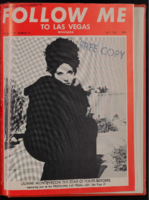
Follow Me to Las Vegas Magazine
Date
Description
Follow Me to Las Vegas, a magazine about art, entertainment, and popular culture in Las Vegas, Nevada. Entertainers and actors are featured in various articles and photographs. The magazine contains several print advertisements of local businesses and organizations.
Mixed Content
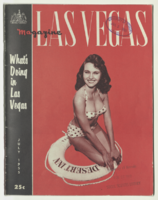
Magazine Las Vegas, volume 6, number 7
Date
Description
Mixed Content
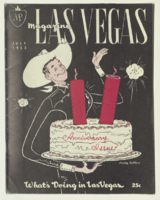
Magazine Las Vegas, volume 4, number 7
Date
Description
Mixed Content

Magazine Las Vegas, volume 5, number 7
Date
Description
Mixed Content
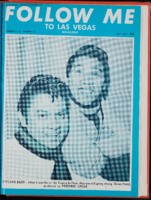
Follow Me to Las Vegas Magazine
Date
Description
Follow Me to Las Vegas, a magazine about art, entertainment, and popular culture in Las Vegas, Nevada. Entertainers and actors are featured in various articles and photographs. The magazine contains several print advertisements of local businesses and organizations.
Mixed Content
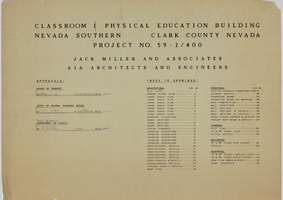
Nevada Southern University classroom and physical education building: architectural drawings
Date
Archival Collection
Description
From JMA Architecture Studio Records (MS-00783) -- Architectural drawings file.
Image

Alpha Kappa Alpha Sorority. Theta Theta Omega Chapter (Las Vegas, Nev.)
Corporate Body Alternate Name
Alpha Kappa Alpha, Incorporated (AKA), is one of the oldest Black sororities in the United States, and was
founded on January 15, 1908 at Howard University in Washington, D.C. AKA is an international service
organization that comprises nearly 300,000 members in over 1,000 graduate and undergraduate chapters
worldwide.
Theta Theta Omega originally started in 1962 when six members of AKA sought to create a graduate
chapter in Las Vegas, Nevada. AKA recruited members by posting notices throughout the Clark County
Corporate Body
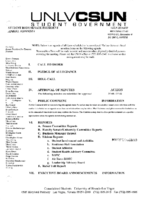
Meeting minutes for Consolidated Student Senate, University of Nevada, Las Vegas, December 04, 2006
Date
Archival Collection
Description
Text

Maria Casas interview, June 12, 2019: transcript
Date
Archival Collection
Description
Interviewed by Maribel Estrada Calderón. Farmersville is described as a small town between, Exeter and Visalia, California populated by Mexican American farm workers. It is in this small town, where UNLV History Professor Maria Raquél Casas spent her childhood raised along with her sisters and brothers. In her interview, Dr. Casas describes how growing up in this small town with her traditional Mexican family influenced the person she is today. While working alongside her family in the fields, Dr. Casas decided that she would strive to obtain an education. Through hard work and constant support from her sister, Dr. Casas attended Fresno State, where she discovered her love for history. Upon completing her undergraduate program, Dr. Casas made the decision to further her education by pursuing a master's at Cornell University. At Cornell, she faced discouraging professors who believed she would not be able to complete the master's program let alone pursue a PhD program. Despite these demoralizing professors, Dr. Casas completed her program and was admitted into University of California Santa Barbara's history program. Dr. Casas never forgot her roots or the significance of her presence in the majority white academic spaces she attended during her academic journey. When she arrived at UNLV, she continued to strive for more Latino representation in both the student population and in the school faculty. During her tenure at UNLV, Dr. Casas has served as an advisor for multiple Latino student organizations including MEChA and SoL. Dr. Casas has witnessed much progress in Latino representation at UNLV, but she believes there is still much work left to be accomplished.
Text
